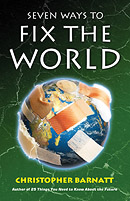 |
|
|
|
You are in: Future Trends : Crowdsourcing
Crowdsourcing
To solve many of the future challenges on the near horizon will demand the collective intelligence and collective action of millions. For most of human history, large numbers of people could only be brought together to work on any form of great undertaking under conditions of dictatorship or mass bureaucracy. But today, with the rise of the Internet, there is now another way. Crowdsourcing refers to the use of the Internet to generate value from the contributions of a great many people. Over the past decade or so, tens of thousands of pioneering individuals have already begun to link together online in radically new cooperative ways. Sometimes this has been to develop free or low-cost products and services that are not being delivered by traditional, profit-first business organizations. In other instances, it has been to help people out, to spread useful information, or to conduct business in new ways. The term "crowdsourcing" was coined by Jeff Howe in 2006 to refer to new mechanisms for distributed, online problem solving. For some, crowdsourcing is purely a term used to refer to new kinds of working arrangement that bring the "crowd" into "outsourcing". However, most people now use the crowdsourcing term to refer to all situations where things are "sourced" from the "crowd", with collaborative Web 2.0 tools used to prevent too many cooks from spoiling the broth. Online PioneersThe potential and power of crowdsourcing are best understood via example. Below I therefore provide links to those initiatives popularly associated with the crowdsourcing concept, or which I personally believe ought to be! If you know of others that you feel should be included, please contact me.
Our Emerging Planetary MindAll of the above provide examples of how it is now possible for hundreds, thousands, or even tens of thousands of ordinary citizens right around the globe to come together to share and create for the common good. In effect, what is happening is that the Internet is starting to be used to interconnect the intelligence of many into a single mind. Given that we now face so many global challenges, it may also be very fortunate that the Internet is starting to permit intelligence to be pooled in this manner. Planetary challenges are, after all, quite likely to require the attention of a planetary mind, and crowdsourcing initiatives like those above already provide some of the best examples of how that mind may be starting to emerge. Today, most people may connect online in virtual communities like Facebook. But increasingly, the activities that people engage in online may prove to be transformative and productive as well as social. We have now built the platform of the Internet. But it may well be that we are only just starting to discover what we can really do with it. Via their development of new products from 3D printers to cars, and computer software to hydroponic growing systems, crowdsourcing initiatives are also starting to demonstrate that quality product development may now take place outside of traditional economic mechanisms. In addition to demonstrating how collective intelligence can be focused online, today's crowdsourcing pioneers may therefore also be highlighting a potential direction of travel for the development of post-industrial and post-traditonal-economic civilization. Today most of us expect for-profit businesses to meet a great many of our practical, physical needs. But as crowdsourcing increasingly takes hold, this may no longer have to remain the case . . . This topic is discussed in more depth in my book Seven Ways to Fix the World. Return to Future Trends.
|
 Crowdsourcing is where online technologies are used to generate value from the activities of a great many people.  Read more in this book |
|
|